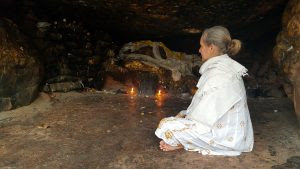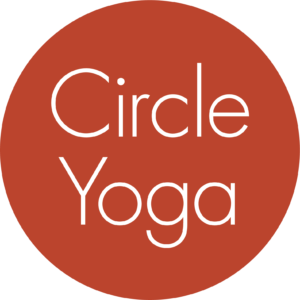August 2016

A few years ago, I got some great advice from the Buddhist nun, Jetsunma Tenzin Palmo. Jetsunma had recently come out of a 12-year stint living alone in a cave in the Himalayas. She slept sitting up in a box at night so she could stay awake and continue her 24-hour meditation practice. By living this way, she hoped to clear away distractions and reach enlightenment. Given her lifestyle, I assumed she believed that the only way to find true wisdom was living without attachment to modern conveniences, comfort, or other people — radical minimalism.
And since that kind of minimalism is not my reality — I have a large extended family, two dogs and two cats, live in a comfortable townhouse in the city and, even after reading Marie Kondo, have at least two dozen pairs of shoes. Listening to Jetsunma made me wonder whether I needed to move to a hut in the mountains in order to truly understand and support the world and myself.
So I asked Jetsunma if she thought I had had any hope of “waking up” while living a life filled with attachments and every kind of convenience — what would she suggest to me? To my relief, she didn’t tell me I needed to move, divorce my husband, or trade my queen-sized bed for a wooden box. She reminded me that my life is just that — my life. It’s the one I have based on multitudes of causes and conditions, some of which I have had control over and some I haven’t. She suggested that rather than waste time wondering about why I have this life or feeling guilty about it, I could use my good fortune for the benefit of all beings.
She said, “Don’t feel guilty, but never become complacent.”
Like you, I get lots of advice — solicited and unsolicited — and some words of wisdom I hear and promptly forget. But these seven words from Jetsunma were logged in my brain and I return to them again and again, especially when I start slipping into guilt or complacency. Her words were with me on a recent trip to India when I visited rural villages where several women showed me how they grow and process rice for their own use and for distribution. Planting and transplanting the rice in the paddy fields (wearing a sari) is only the first step in a long and physically arduous process, leading over the course of months to rice that can be sold for what we would consider a very tiny profit, and also providing their family’s rice for the year. In another nearby village, a young woman squatted making puffed rice, 1/4 cup at a time, in a metal wok filled with black sand. After the rice popped, she used a straw whisk to separate each kernel from grains of sand, spending entire days over the clay stove heated with cow dung just for one week’s worth of cereal. For many of the men and women I met, there were very few conveniences and plenty of difficulties.
It was easy to slip into feeling guilty for not having to work as hard as the women I met in India. And I often feel the same way when reading the news about the struggles that people of color, immigrants, and families living below the poverty line endure in our own country. There’s so much suffering in the world. How can I apply Jutsunma’s words: “Don’t feel guilty but never become complacent”?
By choosing not to feel guilty watching women squatting all day over a hot fire, I opened myself to many other feelings and thoughts, and I experienced the women as whole people, not simply the subject of my guilt. I felt sadness for the physical and emotional challenges they faced living without what I considered the basic comforts of life, but I could also join in the happiness of their laughter as they sat together in their women’s cooperative circle. By choosing not to be complacent, I started to consider what things I could do to make a difference, and I offered what I could. I’m sure I would have had less clarity and openness had I stayed lost under the wrap of my guilt and shame.
“For the warrior, this experience of sad and tender heart is what gives birth to fearlessness. Real fearlessness is the product of tenderness. It comes from letting the world tickle your heart, your raw and beautiful heart. You are willing to open up, without resistance or shyness, and face the world. You are willing to share your heart with others.” — Chögyam Trungpa Rinpoche
There is no one right or easy way to deal with the suffering we encounter. I was born into a white middle class family in Michigan, USA with all that brings with it, just as the women I met in the villages of India were born into their lives with all that comes with it, and billions of people in the US and other countries suffer as a result of the lives they have been born into. Sometimes it’s hard not to just turn away and sink into the pit of our own guilt.
But my practice now is to, very imperfectly, hold my good fortune and privilege lightly and at the same time with deadly sincerity. To turn toward the suffering I witness with as much open-heartedness and open-handedness as I can muster, even though I know my attention and actions alone won’t change the world. I continue to let Jetsunma’s words guide me like a North Star, and I offer you, if you live with any kind of comfort and privilege, her wisdom as well. You don’t need to live in a cave. Just “don’t feel guilty but never become complacent.”
with love,
annie.

Hi Annie: This is such a wonderful and insightful posting. Thank you for sharing your thoughts with such openness and sincerity.
With warm wishes,
Sumana
Dear Sumana – HOW wonderful to hear from you. We miss you here at Circle Yoga. I’m glad you liked this post, this is an ongoing open question for me. xo
I love this Annie. I especially love these lines: By choosing not to feel guilty watching women squatting all day over a hot fire, I opened myself to many other feelings and thoughts, and I experienced the women as whole people, not simply the subject of my guilt.
My question to you would be, how do you ignite non-complacency in others? What does that direct action actually look like? Otherwise, I fear that this could easily slip into misguided permission to take a spiritual “pass” and just go on being complacent – the non-complacency addressed only because, “there, I thought about it, now everything’s good.”
thanks for your honest writing.
all love,
molly
Hi Molly… thank you for writing back about this. Great question, of course.
And I guess I always go back to not knowing whether what I am doing is leading to a better outcome, the same outcome, or a worse outcome, so how can I possible know what is better for someone else to do? This is discouraging and also liberating to me. Thomas Merton says: “Do not depend on the hope of results.. you may have to face the fact that your work will be apparently worthless and even achieve no result at all, if not perhaps results opposite to what you expect… you gradually struggle less and less for an idea and more and more for specific people.”
Margaret Wheatley wrote a great article on this: To Be Free From in which she says, “I’m learning what right action feels like” and that’s kind of what I’m trying to do, to feel into it for myself in each moment. I am starting from a numbness, though, like I never learned how right action feels, and trying to figure it out with every act and breath. Imperfect? definitely. But, like every other question I come up against, it seems to have only an experiential answer, not a fixed one.So I guess what I’m saying is that I don’t feel I can motivate others, except to point them to their own heart and felt sense. Would love to hear how that lands for you. love, annie.
Thanks, Annie. I really appreciate that post. As someone who frequently experiences guilt about privilege, I appreciate the reminder that there is value in just being with others in an open hearted and openhanded way. That being – and not just doing – can be a way of contributing.
Thanks for your note, Jennifer. Glad the post connected… and yes, being not just doing… or maybe discerning when to be and when to do? 🙂 xo annie.